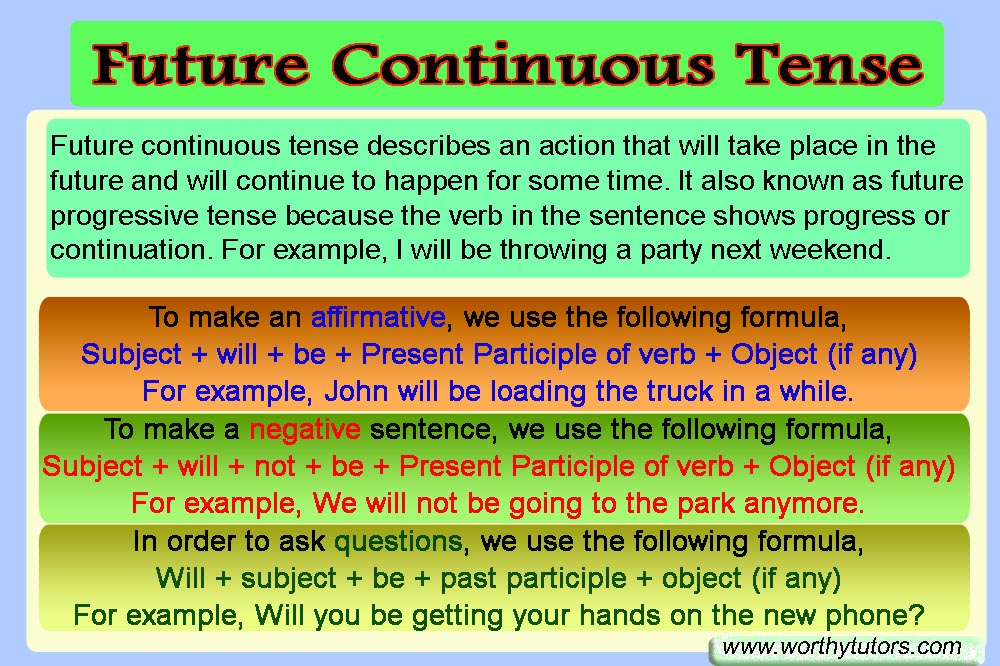
Future Continuous Tense | English Grammar
FUTURE CONTINUOUS TENSE
Introduction to Future Continuous Tense
Future continuous tense describes an action that will take place in the future and will continue to happen for some time. It also known as future progressive tense because the verb in the sentence shows progress or continuation.
For example,
- I will be throwing a party next weekend.
- Elijah and Marcel will be looking for the ring when they get back home.
- The court will be resuming the hearing tomorrow.
- We will be going back to our rooms after a while.
In all the examples above, actions will be taking place in the future and are progressive in nature.
Before discussing the format of Future Continuous Tense, we shall discuss present participles, dynamic verbs and static verbs.
Present Participles
Note: Present participles of verbs are formed by adding -ing with the base form of verb. Present Participles of verbs are used in all the continuous tenses. For example,
- Look becomes looking
- Take becomes taking
- Feed becomes feeding
- Lack becomes lacking
Dynamic Verbs vs Stative Verbs
The term dynamic means in motion. The term static means still, unable to move. Dynamic verbs show an action or process, while stative verbs describes emotions.
– Dynamic Verbs
Dynamic verbs show an action or process. We use present participle form of dynamic verbs in continuous tenses.
For example,
- Laura will be painting the walls next week.
- Sam and George will be taking a test ride of the boat in the morning.
– Stative Verbs
Stative verbs describe emotions, thoughts, states and conditions. Stative verbs are used in simple and perfect tenses. They cannot be used in a continuous form.
For example, the following sentences are not grammatically correct.
- Alex and Paul will be loving the pet once they see it. (Wrong)
- A and Paul will love the pet once they see it. (Right)
- Georgiana will be preferring the white dress over black. (Wrong)
- Georgiana will prefer the white dress over black. (Right)
- Diana will be possessing supernatural powers after they cast the spell on her. (Wrong)
- Diana will possess supernatural powers after they cast the spell on her. (Right)
Forming sentences in Future Continuous Tense
In order to form sentences in future continuous tense, the following formats are followed.
How to form affirmative sentences in future continuous tense?
To make affirmative sentences in future continuous tense, we follow the following format.
Subject + will + be + Present Participle of verb + Object (if any)
For example,
- John will be loading the truck in a while.
- Sarah will be testing the machinery tonight.
- We will be singing songs in the choir after one hour.
- Felix and Kara will be reading stories to their kids at bedtime.
How to form negative sentences in future continuous tense?
To make negative sentences in future continuous tense, we follow the following format.
Subject + will + not + be + Present Participle of verb + Object (if any)
For example,
- We will not be going to the park anymore.
- Ali and Alia will not be eating cakes from now onwards.
- Elijah and Nick will not be fighting each other.
- I will not be joining you guys for the party.
How to ask questions in the future continuous tense?
In order to ask questions in future continuous tense, we follow the following format.
Will + subject + be + past participle + object (if any)
For example,
- Will you be getting your hands on the new phone?
- Will Laura be cooking food for them all?
- Will we be dividing the treasure equally among us all?
- Will Owen and Clause be celebrating their victory?
You Might Be Interested In
- Simple Past Tense
- Past Continuous Tense
- Past Prefect Tense
- Past Prefect Continuous Tense
- Simple Present Tense
- Present Continuous Tense
- Present Perfect Tense
- Present Prefect Continuous Tense
- Simple Future Tense
- Future Prefect Tense
- Future Continuous Prefect Tense
English Grammar
Tenses
Punctuation Marks
Parts of speech
Writing skills
Public Submissions
Testing/Exam
Grammar Rules
English Vocabulary